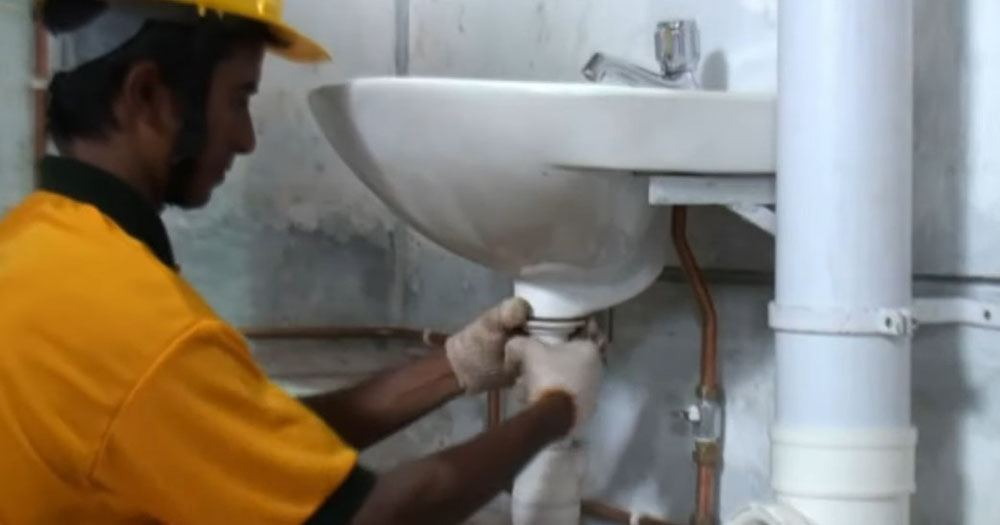Licensed plumbers in Singapore can earn an average of S$6,000 to S$8,000 per month, a member of the Singapore Plumbing Society has claimed.
Speaking to Shin Min Daily News, 40-year-old Gary Tan, who is also the youngest member of the society's management committee, added that there have supposedly even been instances where such plumbers have earned up to S$12,000 in a month.
He also claimed that licensed plumbers can charge and earn more than twice as much as unlicensed plumbers.
In addition, they do less "dirty work", with a role that is more related to carrying out inspections instead, and have more room for promotion, he said.
In his case, Tan said that he joined his current company eight years ago as a plumber, starting out as a "project engineer".
He took the course to become a licensed plumber with the support of his company, two years after he joined, and was subsequently promoted to the role of project manager.
Plumbing industry suffers from shortage of labour despite attractive salaries
However, while salaries for licensed plumbers can be high, the plumbing industry still suffers from a shortage of labour, Tan added.
The industry is "heavily reliant" on foreign workers and companies are hiring fewer foreigners due to the need to pay higher taxes, he said.
As for why few people become licensed, one reason is the cost and time spent for the course, Tan noted.
Obtaining a license requires six to nine months of training, and about S$1,000, after subsidy, for locals.
In the case of foreign plumbers, however, this cost rises to S$4,000 which can be expensive for the company employing them, he highlighted.
It is for this reason that Tan estimates that about half of the foreign plumber workforce in Singapore is unlicensed.
In response to Mothership's queries about the hesitance of local plumbers to take the course in obtaining a license, despite the prospects of earning a higher salary, the President of the Plumbing Society, Dickrose Masalamani, replied:
"To become a PUB-licensed plumber, local plumbers must have a minimum of two years of plumbing experience and complete a nine-month course offered by the Building and Construction Authority (BCA), as well as a nine-day course administered by the Singapore Plumbing Society (previously conducted by PUB).
The assessment for these courses includes written tests and oral interviews, which can pose challenges for some local plumbers. There have been cases where local plumbers failed the interview multiple times."
Masalamani pointed out that there are currently 1,070 licensed plumbers in Singapore, of which 1,010 are locals and permanent residents, while the remaining 60 are foreigners.
He added, "We are not sure of how many unlicensed plumbers in Singapore as they are not registered."
Industry suffers from an aging workforce
In addition, the shortage of labour is compounded by the industry's aging workforce, both Tan and Masalamani noted.
Tan estimates that the average age of plumbers in Singapore is 50 to 60 years old.
"I have colleagues who are above 70 and still working," he added.
According to Tan, young people do not want to join the industry out of concerns regarding the working environment and salary.
However, there have been efforts to attract young people to the industry through various means such as social media, he clarified.
Tan, who is also in charge of the society's training courses, said that these efforts appear to have had some level of success, with the proportion of young people attending the courses rising from 10 per cent in 2022 to 30 per cent this year.
When asked by Mothership about what is being done to address the shortage of plumbers, Masalamani added:
"We have held dialogues with NTUC and PUB recently to see how we can promote the plumbing trade to attract more plumbers to join the sector, such as developing the Career Progression Model to attract the local workforce to join the industry. We will announce more in due course."
Only licensed plumbers can carry out repairs and cleaning in places like shopping centres and commercial buildings
Tan also claimed that for independent renovation and construction projects, more than 90 per cent of the plumbers who are hired are unlicensed as there is no requirement for them to actually hold a license.
In comparison, only licensed plumbers are allowed to carry out repairs and cleaning operations in buildings such as shopping centres, he added.
Hence, licensed plumbers can work more than 12 hours on their busiest days, covering up to five or six buildings, Tan said.
Masalamani elaborated that the clientele for licensed plumbers ranges from residential home owners, town councils, commercial building owners, and building construction companies to the projects of local authorities such as PUB and its plants, the Housing Development Board (HDB) and the Land Transport Authority (LTA), among others.
In total, the licensed plumbing workforce of 1,070 covers about 20,000 buildings in Singapore, Masalamani added.
When asked by Mothership if having more licensed plumbers would contribute to an increase in renovation and construction costs, Masalamani replied that this will eventually happen.
"With the recent inflation, there is already a spike in home renovation and minor construction cost. We see this trade upskill as (a way) to professionalise the plumbing trade in the long run and cost increase is inevitable."
As for the benefits of having licensed plumbers for renovation and construction projects, Masalamani added:
"Licensed Plumbers are well-versed in plumbing codes, regulations, and best practices. Their expertise ensures that plumbing installations, repairs, and maintenance are done correctly and safely. As we are heading in the direction of professionalising the plumbing trade, this will raise up the standards across all industries, including small jobs."
Top screenshot via BCAsingapore/YouTube
If you like what you read, follow us on Facebook, Instagram, Twitter and Telegram to get the latest updates.

